We Asked 2,000 Americans About Their Poop. Here's What They Told Us.

From bloating and gas to GI diagnoses and bidets, our exclusive survey reveals what’s really going on in people’s bathrooms—and why millennials are leading the gut health charge
Hey, how’s your poop?
It’s not like you haven’t thought about it. Digestive health is everywhere these days. Social media trends like fibermaxxing and microbiome tests promise to fix your gut troubles, while emerging research and anecdotal stories continue to show a growing colorectal cancer epidemic among young adults.
Here at Health, we wanted to get to the bottom of things and take a gut check on how Americans are really feeling about their bowel movements.
So, we asked—and you answered. This summer, Health surveyed 2,001 adults living in the U.S. about all things digestion, including their poop patterns, bathroom habits, stomach symptoms, and beyond.
The results? For most Americans, their poop is usually fine—not great—and can sometimes be stressful, confusing, or scary.
Stomach issues are all too common, with the majority of people experiencing gas (73%) and bloating (52%) at least sometimes. And nearly half of people have been diagnosed with a gastrointestinal (GI) condition like irritable bowel syndrome (IBS), gastritis, or inflammatory bowel disorder (IBD).
While poop problems certainly don’t discriminate, one group consistently reported the most issues: millennials.
A Closer Look at Bathroom Habits
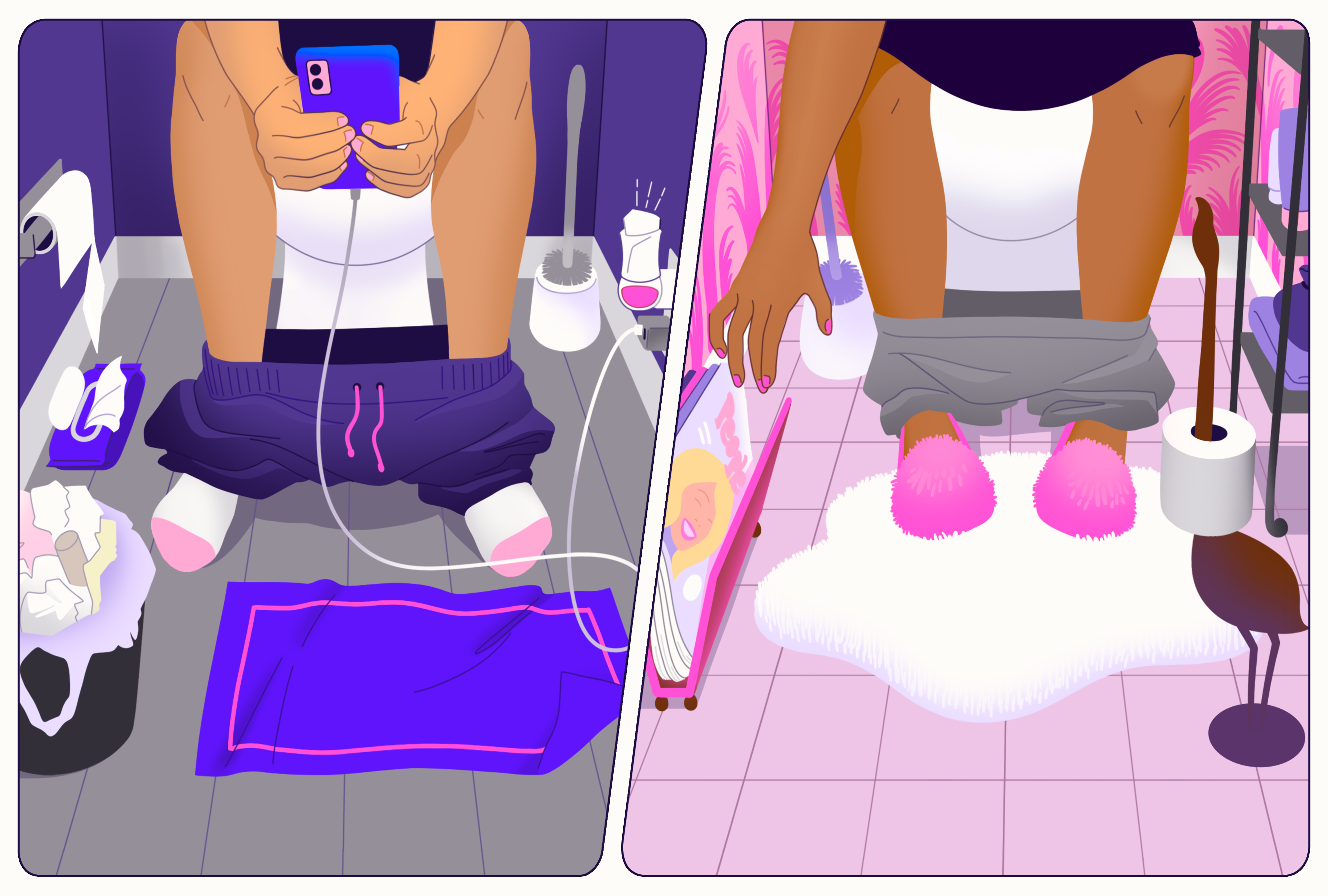 From Probiotics to Squatty Potties, Millennials Are Changing the Way We Poop
From Probiotics to Squatty Potties, Millennials Are Changing the Way We Poop
 Do You Spend Too Much Time on the Toilet? What Your Bathroom Habits Say About Your Gut Health
Do You Spend Too Much Time on the Toilet? What Your Bathroom Habits Say About Your Gut Health
 Think Checking Your Poop Is Weird? 83% of Americans Do It—And Doctors Approve
Think Checking Your Poop Is Weird? 83% of Americans Do It—And Doctors Approve
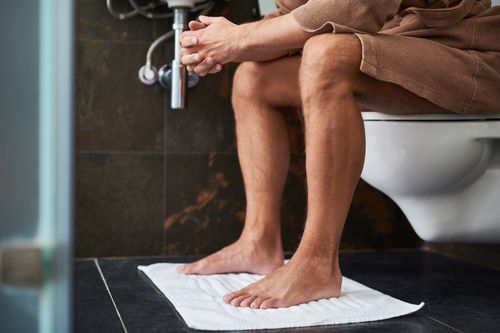 Many Adults Are Stressed Over When and Where They’ll Poop Next—Can You Get Over ‘Poop Anxiety’?
Many Adults Are Stressed Over When and Where They’ll Poop Next—Can You Get Over ‘Poop Anxiety’?
Millennials and Their Gut Health: What the Data Really Reveals
Millennials—the group of adults currently aged 29 to 44—reported more digestive problems and greater efforts to manage those issues than any other age group.
Just about half of millennials have been diagnosed with at least one digestive disease, the highest percentage compared to other generations like Gen Z (30%), Gen X (42%), or boomers (42%). IBS is near the top of conditions plaguing this group—22% of millennials have been diagnosed with any form of the disorder, including IBS-C and IBS-D; they're more likely to have gastritis, gastric ulcers, and infections like C. diff and intestinal parasites, as well.
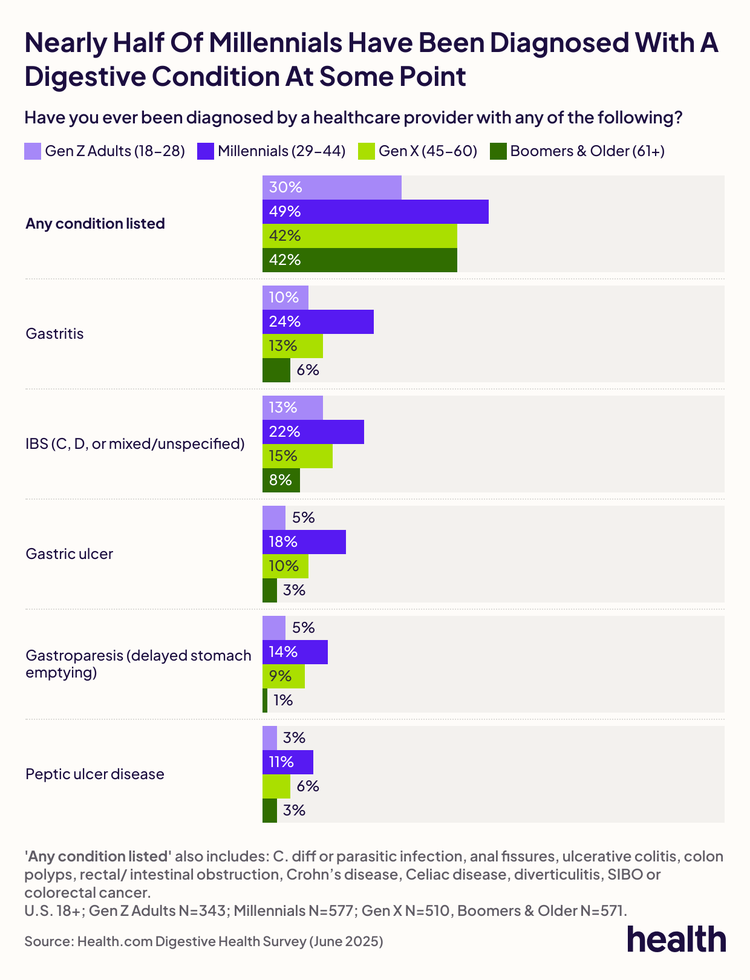
Health.com / Datawrapper
Millennials are also taking steps to manage their digestive health more than other generations—they're significantly more likely (55%) to have ever seen a doctor for a digestive issue than boomers (29%), and to have ever taken prescribed medications for their GI symptoms (59% for millennials, 36% for boomers).
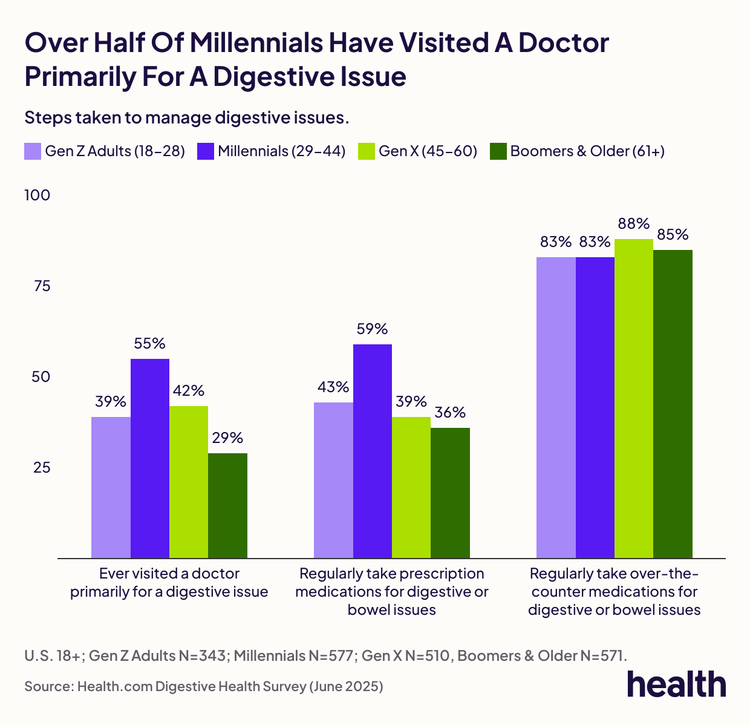
Health.com / Datawrapper
And it’s not just that. Millennials are tapping into the poop tech and holistic digestive health scene, too: More than two-thirds say they own flushable wipes, toilet stools, bidets, or seat warmers. Among those above the age of 61, on the other hand, less than half invest in these types of products. Millennials are also most likely to manage their stomach issues through diet compared to other generations.
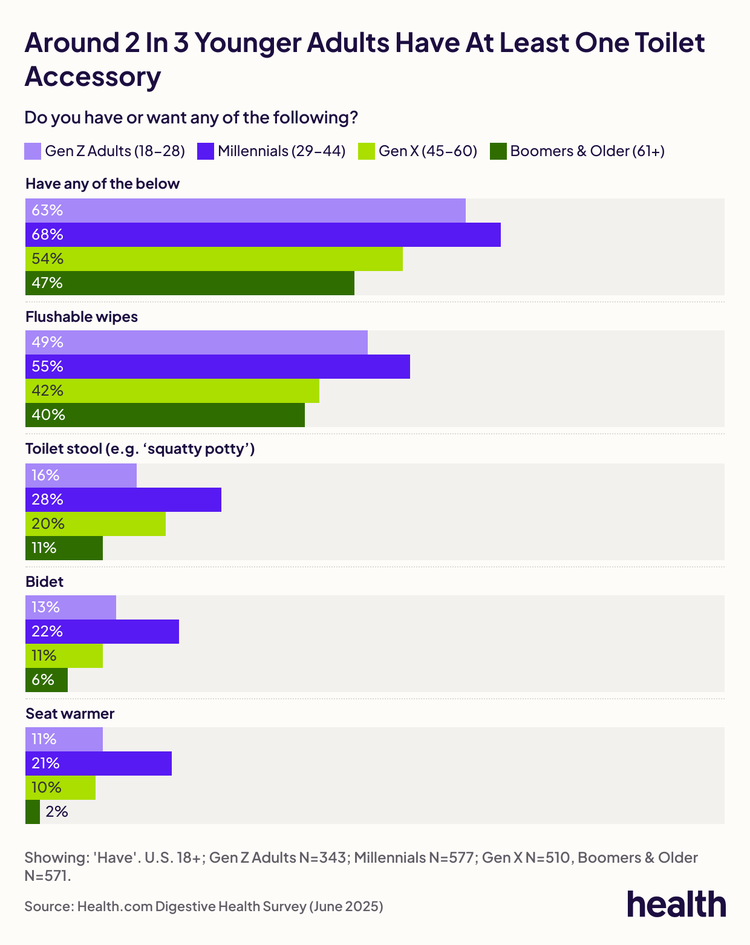
Health.com / Datawrapper
All of their management isn’t necessarily curbing poop-related stress and anxiety, though: Young adults—83% of Gen Z and 80% of millennials—reported feeling anxious about pooping, or that their bowel movements have been affected by stress or mental health issues. That's compared to just 69% of Gen X and 50% of boomers.
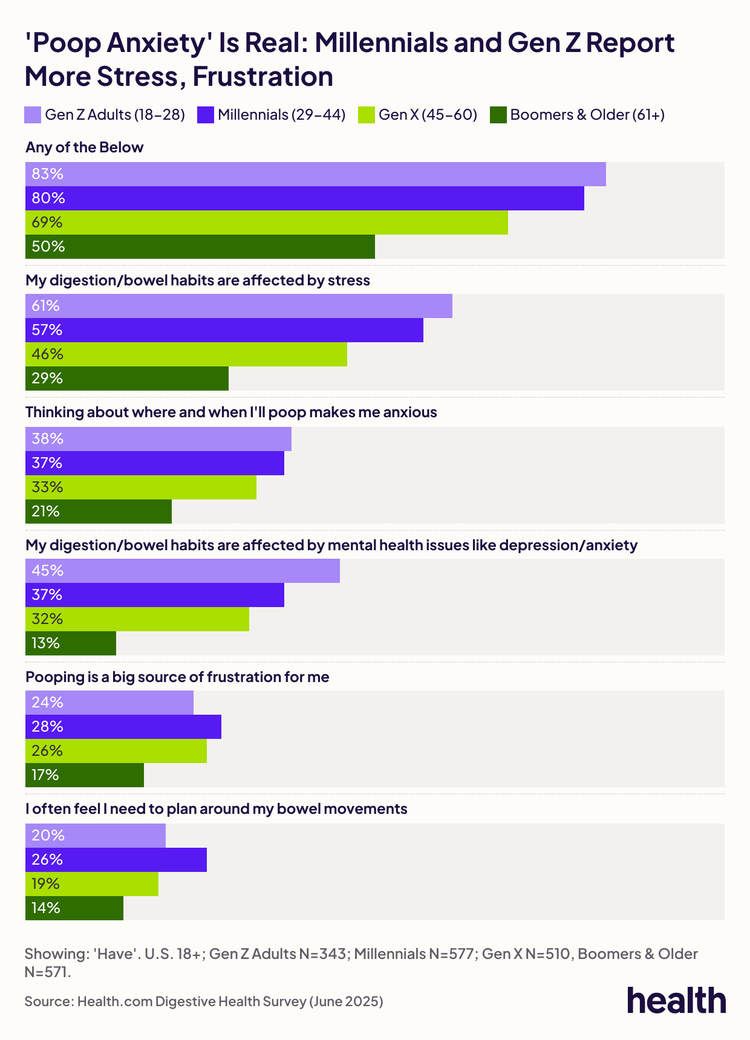
Health.com / Datawrapper
What Your Poop Is Trying to Tell You
 Blood, Mucus, or Funky Shape: When Should You Actually Be Concerned About a Weird-Looking Poop?
Blood, Mucus, or Funky Shape: When Should You Actually Be Concerned About a Weird-Looking Poop?
 Why Does My Poop Smell So Bad? 8 Possible Reasons
Why Does My Poop Smell So Bad? 8 Possible Reasons
 What Causes Undigested Food in Stool?
What Causes Undigested Food in Stool?
 Why Is Your Poop Fluffy?
Why Is Your Poop Fluffy?
Why Millennials Are Talking (and Worrying) About Their Poop More
What’s going on? Why are millennials feeling the brunt of these digestive woes? It’s hard to say—but experts have some theories.
First, it may be a mix of social media savvy and openness. “[Millennials] are just a lot better educated and they feel a lot more comfortable than previous generations talking about their GI symptoms,” Benjamin H. Levy III, MD, gastroenterologist at the University of Chicago Medicine, told Health.
This increased awareness and comfort may also make millennials more likely to seek medical care than older generations.
“People used to suffer in silence until it became so problematic that they had to seek out professional help,” Julie Stefanski, RDN, spokesperson for the Academy of Nutrition and Dietetics with a private practice in Pennsylvania, told Health. “Older groups of individuals weren't always interested in preventative care.”
The rise in early-onset colorectal cancer and other GI cancers may also be a factor. People born around 1990 have double the risk of developing colon cancer and quadruple the risk of developing rectal cancer in their lifetime, compared to those born around 1950.
Because of this trend, the U.S. Preventive Services Task Force lowered the recommended colorectal cancer screening age from 50 to 45 in 2021.
Experts are still exploring the potential reasons behind the rise of colorectal cancer in this population, such as a higher consumption of ultra-processed foods, growing obesity rates, increased alcohol consumption, or greater exposure to DNA-damaging bacteria.
These factors may also help explain the heightened digestive issues in millennials. But beyond the physical symptoms, experts suspect that awareness of the higher colorectal cancer risk in their age group has made millennials more vigilant.
“There are a ton of patients, when they have GI symptoms, they're a lot more likely now to come seek medical attention because of that—because they want to make sure that it's nothing going on,” Levy said.
Common Digestive Disorders
 How Gastrointestinal Diseases Can Affect You
How Gastrointestinal Diseases Can Affect You
 The Link Between Constipation and Nausea
The Link Between Constipation and Nausea
 Signs and Symptoms of IBS in Women
Signs and Symptoms of IBS in Women
 What Is the Difference Between IBS and Colon Cancer?
What Is the Difference Between IBS and Colon Cancer?
Your Gut Health Checklist: What to Do, What to Ditch, and When to See a Doc
They may be proactive about their stomach issues, but millennials may also be “worried well,” said Stefanski. The heightened focus on digestive health could be making them mistake normal digestion for more serious problems.
So what’s normal and what’s overboard? Start by looking at your poop every time you go, Harmony Allison, MD, associate chief of gastroenterology at Tufts Medical Center, told Health. While many millennials look at their toilet paper after they wipe (60%), more could stand to look at the poop in the actual toilet bowl—just 42% do that, the lowest percentage of any generation.
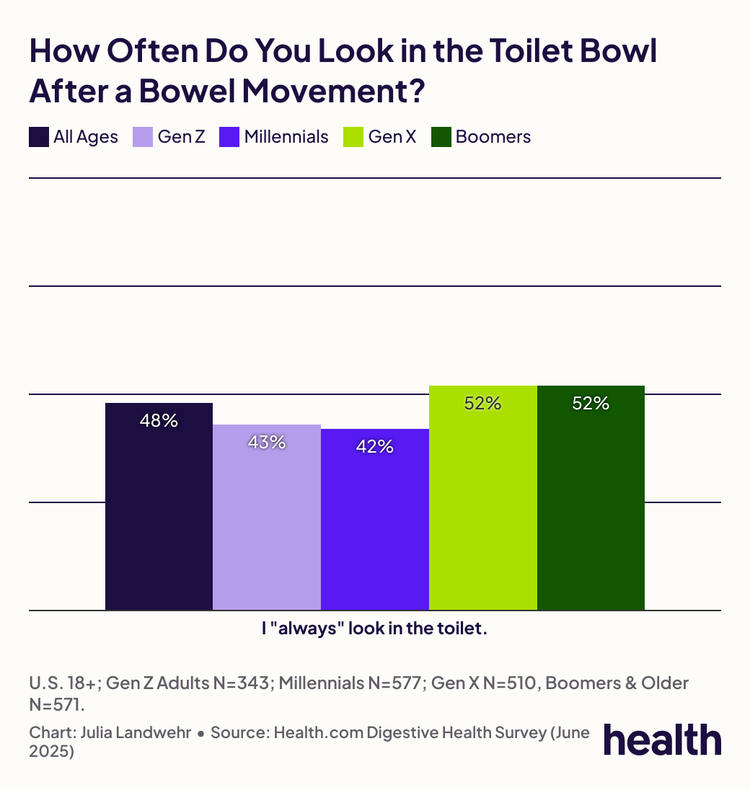
Health.com / Datawrapper
“It’s very, very important to see what’s going on,” said Levy.
You’re looking for a smooth and soft poop that curls around the toilet like a snake or sausage—it should pass easily without strain and should be a medium to dark brown.
You’re also examining your poop for any red flags, including pencil-thin stools, poop that has blood on top or mixed in, or poop that looks significantly different than what you usually see in the toilet.
For management, all the trendy supplements and poop tech tools may be fine, but experts say your best bet is going back to the basics, like:
- Limiting ultra-processed foods and focusing on whole foods
- Eating 3-5 servings of fruits and veggies each day
- Drinking 8-9 cups of water daily
- Moving your body throughout the day
- Getting plenty of sleep—at least 7 hours a night
- Taking a fiber supplement (if recommended by your doctor)
While these tips will help support digestion, experts recommend seeing a healthcare provider if you’re experiencing the serious GI symptoms described above.
“While it’s good to read up about all this stuff and try a couple things maybe before they see a doctor, if they’re still having symptoms, then they should seek care,” Levy said, “because we can make it a lot easier for them and help get their life back to normal a lot quicker.”
Health.com surveyed 2,001 adults living in the U.S. from June 11-19, 2025. The survey was fielded online via a self-administered questionnaire to an opt-in panel of respondents from a market research vendor. In order to qualify, respondents must be over the age of 18 and living in the U.S. Quotas were implemented in sampling using benchmarks from American Community Survey (ACS) from the U.S. Census Bureau for age, race/ethnicity, and household income.
How to Improve Your Gut Health
 Does Fiber Make You Poop? The Role of Fiber in Digestion
Does Fiber Make You Poop? The Role of Fiber in Digestion
 5 Foods for Better Gut Health and Digestion
5 Foods for Better Gut Health and Digestion
 9 Supplements for Optimal Gut Health, According to a Dietitian
9 Supplements for Optimal Gut Health, According to a Dietitian
 13 Yoga Poses To Relieve Gas and Bloating
13 Yoga Poses To Relieve Gas and Bloating
 Amber Brenza
Amber is the Associate Editorial Director overseeing news content for Health, ensuring that readers stay up-to-date on trending topics like COVID-19, as well as the most recent research in the health and wellness space.
learn more
Health with a background in health, science, and investigative reporting. Previously, she wrote full time about parenting issues for the app Parent Lab. Before that, she worked as a reporter for National Geographic covering wildlife crime and exploitation." tabindex="0" data-inline-tooltip="true"> Jani Hall,
Amber Brenza
Amber is the Associate Editorial Director overseeing news content for Health, ensuring that readers stay up-to-date on trending topics like COVID-19, as well as the most recent research in the health and wellness space.
learn more
Health with a background in health, science, and investigative reporting. Previously, she wrote full time about parenting issues for the app Parent Lab. Before that, she worked as a reporter for National Geographic covering wildlife crime and exploitation." tabindex="0" data-inline-tooltip="true"> Jani Hall,
 Jani Hall
Jani Hall is a news editor for Health with a background in health, science, and investigative reporting. Previously, she wrote full time about parenting issues for the app Parent Lab. Before that, she worked as a reporter for National Geographic covering wildlife crime and exploitation.
learn more
Health, where she edits and publishes news articles on trending health and wellness topics. Her work has been featured in The Heights, an independent student newspaper at Boston College, and Minnesota Monthly." tabindex="0" data-inline-tooltip="true"> Julia Landwehr,
Jani Hall
Jani Hall is a news editor for Health with a background in health, science, and investigative reporting. Previously, she wrote full time about parenting issues for the app Parent Lab. Before that, she worked as a reporter for National Geographic covering wildlife crime and exploitation.
learn more
Health, where she edits and publishes news articles on trending health and wellness topics. Her work has been featured in The Heights, an independent student newspaper at Boston College, and Minnesota Monthly." tabindex="0" data-inline-tooltip="true"> Julia Landwehr,
 Julia Landwehr
Julia is the associate news editor for Health, where she edits and publishes news articles on trending health and wellness topics. Her work has been featured in The Heights, an independent student newspaper at Boston College, and Minnesota Monthly.
learn more
and
Jenna Anderson
Read more:
Julia Landwehr
Julia is the associate news editor for Health, where she edits and publishes news articles on trending health and wellness topics. Her work has been featured in The Heights, an independent student newspaper at Boston College, and Minnesota Monthly.
learn more
and
Jenna Anderson
Read more:
This story originally appeared on: Health News - Author:Jenna Anderson















